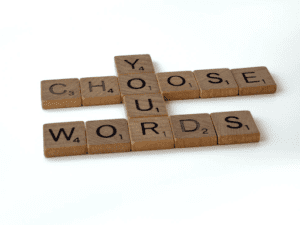Whether you are supporting someone who is in recovery or you’re urging someone with an addiction to seek help, what we know is that how we talk about addiction matters. Choosing our words with intention can mean the difference between our loved ones reaching out for the support they need or falling further into the cycle of shame and silence.
One of the greatest fallacies we learn in life is taught to us as a nursery school rhyme. It’s a damaging and pervasive concept that locks a vicious loop of hurt in every level of our relationships.
Sticks and stones may break my bones, but words will never hurt me.

In truth, words are everything. Words are how we engage and understand not just one another, but also ourselves and the world around us.
Changing the words we use to acknowledge their power is valuable in every aspect of our lives. When supporting someone in their addiction, it can be the single most vital change between healing and harm. A change in your language can mean the world to your loved one and reinforce the work we do at Promises Behavioral Health.
Words matter in addiction treatment.
From an early age, we are taught the difference between good and bad, right and wrong. What we are taught less often is to discriminate in these judgments between people and actions. Without proper attention, we often confuse the two. We say, “they are wrong” or “they are bad,” rather than recognizing the power over identity that we are offering up to this tiny piece of who they are.
On the other hand, when it feels like someone sees us for who we are and what we could be and looks past what we’ve done, our potential feels infinite. It is incredibly empowering to feel like those around you believe in you.
When we place emphasis on who our addicted loved ones are as a whole, instead of part and parcel, it’s easier to recognize the potential within. More importantly, the focus on wholeness reminds us of where we come from and what we can do when we fall short.
Focusing on wholeness works to empower us never to forget the humanity of the person we’re talking to. They are all the things bold, dark, beautiful and messy that make them who they are.
They are not an addict; they are a person with an addiction.
When we talk about addiction, putting the weight of language on who instead of what can redirect the emotional fallout of the conversation. It’s important to remember that doing so is not a concession to political correctness.
In addiction recovery, it is compassionate engagement with a human that can increase their likelihood of seeking treatment. They will believe themselves worthy of holistic healing across all segments of life instead of simply targeting change at the level of behavior. Those who live with an addiction are more likely to see success in addiction treatment when the language used to discuss their recovery is person-first.
Person, not problem.
When we talk about addiction, the stories we tell with the words we choose make room for a dangerous stigma. Person-first language recognizes the gravity of addiction and the hope we have to overcome it. Instead of inflammatory words that call to mind blame, it is nonjudgmental and creates a helpful disconnect between the person and the addiction.
The truth is, words can hurt us. Often they leave indelible marks on the stories we tell ourselves about the world or our worth and ability. Words form our narrative about who we are and how we feel (or how we “should” feel) when we engage with the world. We think and speak with words, and we use them to communicate our every emotion. Of course, they can hurt us.
But even when words hurt, they are only part of the way we communicate. Other forms of expression often accompany words, which is mirrored in the way parts and traits make up a whole person. Your character is not a single thing about you but a summary of everything you are.
For too long in our culture, we treated addiction as a flaw of character. Once we label someone as an addict, that is all they are to us. They become their flaw and wear the label accordingly. But it’s that very thinking that’s flawed, not the person.
Someone who has an addiction is not just an “addict.” They are a fusion of their world experiences, and here we are reducing them to a single struggle. They have an addiction, but they are not their addiction.
Why change?
In short: because what we’re doing isn’t working. If we want to leave our loved ones feeling empowered as they walk through addiction treatment and recovery, we have to change too.
Addiction is a medical problem and should be treated as such. While the language we use is not going to provide emergency care during an overdose, it can help those with substance abuse disorders to seek treatment and stay committed even when it gets hard.
The fallout of defensive and judgmental language in addiction and recovery includes, but is by no means limited to:
- Alienating someone who needs your support
- More punitive choices made in seeking treatment and the treatment itself
- Creating an environment of blame instead of healing
- Provoking more internal turmoil, which may lead to seeking out the very behaviors that they’re trying to extinguish
Harsh language and stark reality have a time and place. But it doesn’t belong in your message of support to your loved ones.
The effect of stigma in addiction service providers.
Think about how much more likely you’d be to return to a doctor who tells you that you have an infection over a doctor who tells you you’re diseased. At the root, they’re both saying the same thing.
When you have an infection you are, by definition, diseased. But that hurts, and it makes us defensive and less optimistic about our future. When you feel defensive, why would you continue to seek pain when what you’re trying to heal from is already painful?
Service providers aren’t infallible in this, nor are they immune to the power of language in the way they treat their patients. The power of language is evident in research led by Dr. John F. Kelly and Dr. Cassandra M. Westerhoff that indicates a connection between providers’ words and their therapeutic approach.
Using words associated with blame or judgment, like “clean” and “dirty,” can increase the blame placed on the patient and alter the way we approach treatment. It can mean the difference between criminal sentencing and medical treatment. Substituting stigmatized language for a less judgment-centered tone led to less punitive therapeutic approaches in a large margin of study participants.
So what do I say instead?
Talking about addiction and recovery in damaging language doesn’t bring healing or encourage sustainable change. Obviously, the stigmatized language needs to go but that leaves a vacuum for how to talk about the change that is desperately needed. Avoiding important conversations isn’t the answer, so what is?
There is no clear-cut determination but you can swap a few key terms to begin reducing the impact of damaging language. Speaking with intention and compassion is the key to making these linguistic changes.
Try these
Swapping “junkie” or “addict” for a more holistic “patient” or “person with a substance abuse disorder” is a great start. When it comes down to discussing the details of their substance use disorder or treatment, be sure the language you use implies their addiction is not a choice or a casual recreation. Words like “habit” can be harmful when the context is not clear.
Avoiding the word “abuse” altogether is a crucial change you can make right now to reduce shame and defensiveness. Replacing it with “use” (or misuse, in the case of prescription drugs) can have far-reaching effects in empowerment and ensure the focus remains on aiding recovery instead of punishing the addiction.
A list of other terminology swaps and the reason behind them can be found here, but the emphasis should always be on compassionate support of the whole person, not blame for the addiction.
Mistakes happen in recovery.
You will make errors in the language you use to describe addiction and support your loved ones on their recovery journey. They will make errors in how they manage their healing, and they may even revert to the behaviors from which they are recovering. There is no clear linear path in healing or recovery, big or small, but there must always be compassion.
The words we use are an innate part of our society and our mental framework in processing the things we see and experience. Changing it is hard work, so be patient with your mistakes when you make them. Find grace, but do not negate responsibility. Own up to the slips you make in your language. Correct them, apologize for them and move on.
But, in turn, do not forget to find that same compassion for those who are on their journey of recovery. Mistakes happen—big, small and in-between. But so does healing.
Human[kind].

When talking about addiction, find space for healing. It can seem overwhelming so start with something you can control: your words. Let Promises Behavioral Health support your loved ones with words that heal and empower yourself with strong but soft language to hold them in that healing. Reach out today, and let’s learn together.
Be patient.
Be compassionate.
Be human.
After all, we all are.

